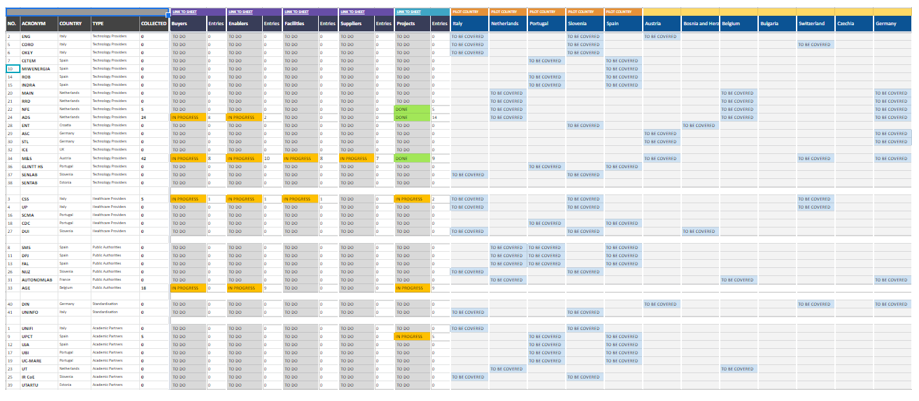
04 Mar ODIN: Project leveraging AI based technology to improve health care delivery in European hospitals
During the past 30 years, Intensive Care Unit beds in Europe have been reduced by about 75 % per million EU habitants. The result was that hospitals all over Europe were unprepared for the COVID-19 pandemic. The current situation shows that hospital budget cuts must be complemented with organizational restructuring including the use of innovative technologies to be successful. The ODIN consortium has identified critical challenges for hospitals, which are the basis for the research on the impact of the increased use of robotics, Internet of Things (IoT) and Artificial Intelligence (AI).
Within a 42 months project the ODIN consortium is aiming to boost AI based technology to improve health care delivery in six leading hospitals in Europe.
Hospitals have to increase their efficiency and productivity. They intend to improve quality and safety and to contain and reduce costs at the same time. ODIN has identified eleven critical challenges within hospitals in advance for which the project will deploy technologies along three lines of intervention:
- empowering workers through the use of AI, cybernetics and bionics,
- introducing autonomous and collaborative robots and
- enhancing medical locations with the Internet of Things (IoT).
These areas of intervention will be piloted in six hospitals in Spain, France, Italy, Poland, the Netherlands and Germany. Seven use cases will be created and the research will analyse patient management as well as disaster preparedness and hospital resilience.
Within the ODIN pilot these multicentred longitudinal cohort studies shall demonstrate the safety, effectiveness and cost-effectiveness of ODIN technologies.
ODIN Objectives
The project pursues four main objectives:
- Objective 1: Setting up an open and secure decentralized digital platform
This platform will support a suite of connected services and Key Enabling Resources (KERs). These include robotic solutions, IoT environments, and extensible specialized AI. It brings together health suppliers and the needs of healthcare organisations and offers practical solutions for them.
- Objective 2: Building a dynamic and collaborative co-creation mechanism for Innovative Procurement Journey (IPJ) between healthcare suppliers and providers
This mechanism will help to identify, understand and specify the health care challenges and needs in terms of functional requirements.
- Objective 3: Implementing a longitudinal cohort study (use cases)
The cohort study will assess the impact, scalability, interoperability and innovation potential for other domains. Through the combination of the three areas of intervention (eWorkers, eLocations and eRobots), the use cases will show to what extent the pilot hospitals are able to address the challenges that they have defined within a co-creational process in advance.
- Objective 4: Setting up a communication and dissemination program and an exploitation strategy in order to reach a critical mass of users and business partners
Through proper communication and dissemination as well as an exploitation strategy the ODIN partners will be able to deliver solutions already during and after the project lifetime. Two open calls and existing open innovation initiatives from both, the demand and supply side in combination with a responsible research innovation approach will enable the project team to reach a critical mass of stakeholders. The business model will support decision makers on the procurement of innovative solutions. It integrates digital services into value-based healthcare and addresses relevant actors inside and outside the hospital.
Members of Consortium
The consortium consists of 20 partners from 10 countries and is coordinated by Medtronic Iberica in Spain.
Additional partners are the Centre hospitalier universitaire Amiens-Picardie (France), Charité – Universitätsmedizin Berlin (Germany), Ethniko Kentro Erevnas kai Technologikis Anaptyxis (Greece), Idryma Technolgias kai Erevnas (Greece), Inetum España (Spain), MINDS & SPARKS (Austria), Mysphera (Spain), Philips Electronics Nederland (Netherlands), Robotnik Automation (Spain), Scuola Superiore di Studi Universitari e di Perfezionamento Sant’Anna (Italy), Servicio Madrileño de Salud (Spain), University of Warwick (United Kingdom), Twi Ellas Astiki Mi Kerdoskopiki Etaireia (Greece), UDG Alliance (Switzerland), Universidad Politécnica de Madrid (Spain), Università Campus Bio-Medico di Roma (Italy), Università degli Studi di Firenze (Italy), Universitair Medisch Centrum Utrecht (Netherlands), and Uniwersytet Medyczny w Łodzi (Poland).
Within the ODIN project MINDS & SPARKS (M&S) has a strong focus on activities concerning dissemination, communication and exploitation as well as creating content for social media. It is initiating trust building activities and enlarging the ecosystem of the project. M&S will identify and establish cooperation with national and European initiatives and projects of similar interest and engage in clustering activities for this purpose.
Links
http://www.odin-smarthospitals.eu/
https://twitter.com/ODIN_H2020
https://www.youtube.com/channel/UCqLpDcUR8FmdaEHY-KAVQrA
Keywords
Artificial intelligence, intelligent systems, multi agent systems; Robotics for healthcare; Machine learning, statistical data processing and applications using Big Data; eHealth; Cybersecurity; Hospital of future, Efficiency gain, European Wide Impact Dimension, Sustainable innovation

